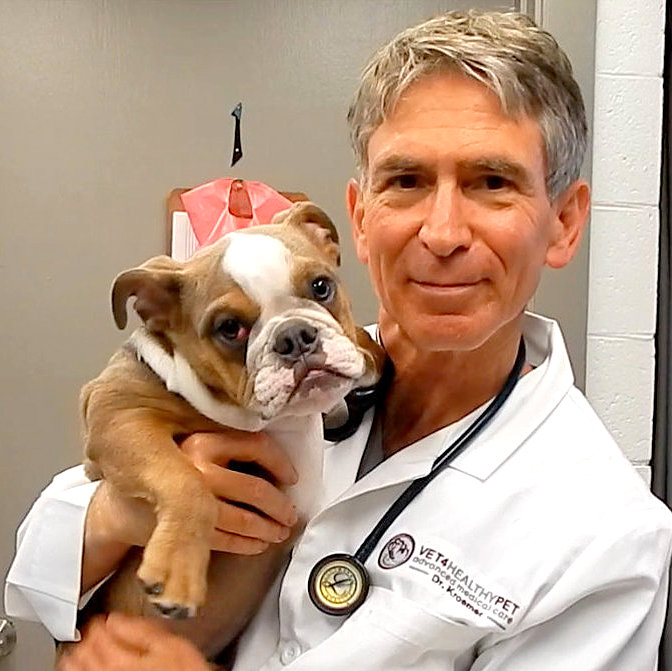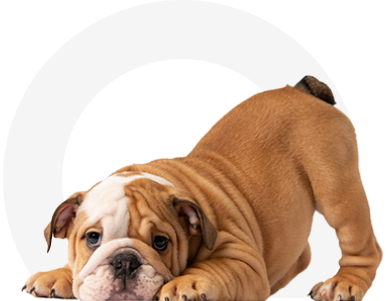Introduction to Urinary Stones In Bulldogs And French Bulldogs
Urinary stones can be a significant health issue for bulldogs and French bulldogs.
They are also known as
➡️ urinary calculi
➡️ uroliths
These stones are essentially hard, crystal-like formations that develop in the urinary tract and include
➡️ Kidneys: Organs that filter waste and excess fluid from the blood, producing urine.
➡️ Ureters: Tubes that transport urine from the kidneys to the bladder.
➡️ Bladder: A muscular sac that stores urine until it’s expelled from the body.
➡️ Urethra: The tube through which urine exits the body, allowing it to be expelled during urination
The formation of these stones can lead to various health problems, depending on their size, location, and the underlying cause.

Urinary Stones in Bulldogs and French Bulldogs TYPE:
Listed below are some of the stone types found in the breed, their commonality, and their origin.
1. BULLDOG STRUVITE URINARY STONES:
Struvite stones are often caused by urinary tract infections (UTIs) and are therefore more common in females with vaginal fold dermatitis and a hooded vulva. They can grow quite large and cause significant discomfort and urinary blockages.

2. BULLDOG CALCIUM OXALATE URINARY STONES:
Calcium oxalate stones are more likely to form in the bladder and can be due to the dog’s diet and metabolism, which cause acidic urine and high calcium blood levels (cushings, parathyroid disease), or genetic predisposition. They are not very common with bulldogs.
3. BULLDOG URATE URINARY STONES:
Urate stones are rare in most breeds but relatively common in bulldogs due to a genetic condition that affects purine metabolism. They are difficult to prevent and manage and require specific dietary and medical management.
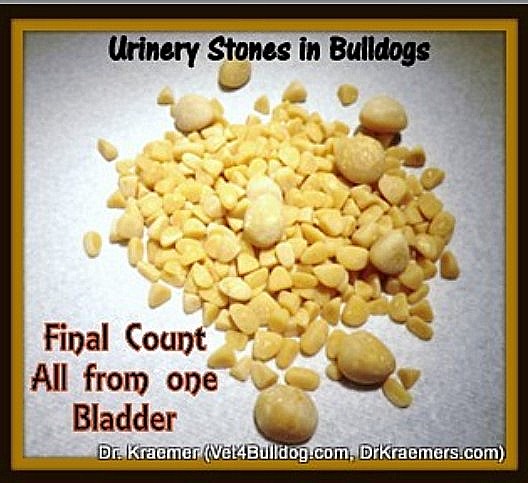
4. BULLDOG CYSTINE URINARY STONES:
Cystine stones are due to a genetic abnormality that leads to excessive cystine (an amino acid) in the urine. They are rare in most dog breeds but common in bulldogs. Despite prevention and management, they are likely to reoccur.
Cystine and urate urinary stones have genetic origin, they are rare in most dog breed but common to bulldogs
Urinary Stones in Bulldogs and French Bulldogs / CAUSE:
- DIET: such as diets with excess minerals and proteins, diets impacting urine PH, and diets impacting hydration.
- WATER: A lack of water can lead to mineral/crystal oversaturation, which will speed up stone formation.
- GENETICS: Urate and Cystine Stones in bulldogs have genetic origins.
- INFECTION: Bacterial infections can lead to urinary stones (Struvite).
- CONGENITAL DEFECTS: such as ectopic ureter, and kidney dysplasia.
- METABOLIC DISEASE: such as excess calcium, as in the case of parathyroid gland disease.
Urinary Stones in Bulldogs and Fr. Bulldogs PRESENTATION:
- INCONTINENCE: pee accidents.
- FREQUENCY: frequent urination.
- STRAIN: painful straining when voiding.
- BLOOD: hematuria, blood in the urine, red urine.
- THICK, DISTENDED ABDOMEN, UNABLE TO PEE: in the event of complete blockage (more common to male bulldogs).
- INABILITY TO URINATE: in the event of a full blockage, that will rapidly lead to a distended, painful abdomen and a critical illness.

Urinary Stones in Bulldogs DIAGNOSIS:
- URINE ANALYSIS: including urine PH, white blood cells, bacteria, crystals, etc.
- URINE CULTURE: bacteria type and ideal antibiotics.
- BLOOD TEST: kidney function and blood count, etc.
- IMAGING: radiographs & ultrasounds are the most common.
- STONE ANALYSIS: tests that determine the stone type.

Urinary Stones in Bulldogs / PREVENTION:
- Genetic Testing
- Neutering: androgen-responsive case (cystine)
- Sufficient water
- Annual urine analysis
- Annual radiograph or ultrasound
- Bully Urinary Health Supplement
- Female proper vaginal hygiene
Urinary Stones in Bulldogs TREATMENT:
- RX DIET: Depending on the stone type, diet helps to reduce offensive minerals or proteins, and improve PH and hydration.
- WATER: Proper hydration helps to dilute the urine and prevent supersaturating.
- ANTIBIOTICS: when a bacterial infection is detected.
- PAIN RX: analgesics to manage pain.
- ANTI-INFLAMMATORY: Anti-inflammatories such as NSAIDs
BULLDOG THERAPEUTIC URINARY SUPPLEMENTS TREATMENT:
PAIN RELIEF: like Dr. Kraemer’s

ANTI-INFLAMMATORY: EFA Omega 3 and Glucosamine, like Dr. Kraemer’s

ANTI-BACTERIAL: Like Dr. Kraemer’s
- V4B Bully Urinary Support, which helps to reduce multi-drug resistance and biofilms.
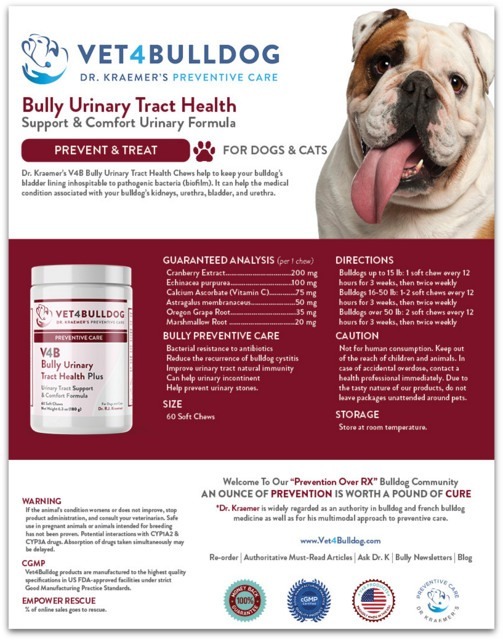
TOPICALS (Bully Antiseptic Wipes): For female bulldog’s proper hygiene and UTI prevention, clean the virginal fold with antiseptic wipes, such as Dr. Kraemer’s
OTHER:
- Laser Therapy
- Stem Cell Therapy
- tPEMT
BULLDOG URINARY STONES SURGERY:
Surgical options depend on
- gender
- stone size
- health status
- stone location
- stone type
- stone history
Bulldog Urinary Stone Cystotomy
A cystotomy is a surgical intervention designed to access the bladder to extract stones. This procedure is frequently utilized to eliminate bladder stones, also known as uroliths, or to remove urethral stones that have been pushed back into the bladder. It’s particularly suited for female bulldogs, given that the occurrence of urethral blockages downstream is uncommon in females, attributed to their broader and shorter urethra
Bulldog Urinary Stone Urethrotomy
Urethrotomy involves making an incision into the urethra to remove stones that are lodged in the urethra. It can provide relief from an obstruction but, like cystotomy, may not prevent future occurrences of stones moving into the urethra and causing blockages.
Bulldog Urinary Stone Urethrostomy
Scrotal urethrostomy is often the preferred surgical method for creating a new permanent urinary opening in male dogs. The procedure involves creating an opening in the urethra through the scrotal area, where the urethra’s diameter is wider, facilitating easier passage for potential future stones and minimizing the risk of blockages.
Bulldog and French Bulldogs Urinary Stone Vaginoplasty
Female Bulldogs and French Bulldogs experiencing recurrent urinary stones, such as struvites, alongside conditions like vaginal skinfold dermatitis and a hooded vulva, may benefit from a corrective surgical procedure known as vaginoplasty. This surgery aims to elongate and open up the vaginal folds and hoods, promoting better air circulation. The primary goal is to alleviate the moist conditions that foster dermatitis, which can be a precursor to repeated urinary tract infections (UTIs) and subsequent stone formation.
Urinary Stones in Bulldogs and French Bulldogs TIPS & WARNINGS
Below are selected urinary stone tips and warnings, courtesy of Dr. Kraemer
URINARY STONES WATER TIP:
Drinking sufficient water will help with normal urination and prevent supersaturation and stone formation.
To help improve the water intake, mix low-salt broth with water, make ice cubes, and add one daily to your bulldog’s water dish.
BULLDOG URINARY STONES CANNED FOOD TIP:
Canned food has more moisture than dry food, which will help in the same manner as above by increasing water intake.
URINARY STONES RX DIETS TIP:
Adhere to your veterinarian’s recommendations for stone dissolution and prevention.
BULLDOG URINARY FEMALE HYGIENE TIP:
Many female bulldogs suffer from vaginal fold dermatitis. Proper daily hygiene with wipes, like Dr. Kraemer’s
- V4B Bully Antiseptic XL Skinfold Wipes can help prevent urinary tract problems.
URINARY STONES IMAGING TIP:
Your bully might exhibit the same clinical signs as a stone or UTI. Therefore, I recommend that you take radiographs and/or an ultrasound of your bully’s abdomen, in addition to urine, to help rule out urethral, bladder, ureter, and/or kidney stones.

BULLDOG CULTURE & SENSITIVITY:
Urine analysis is not adequate for ruling out bacterial infections (UTI).
A culture and antibiotic sensitivity test should be combined with it to determine the bacteria type and best antibiotic combination.

URINARY STONES BACTERIA RESISTANCE WARNING:
Bacteria can defend themselves by adhering to your bulldog’s bladder wall and forming a biofilm. There are various natural supplements, such as extracts, like
- Dr. Kraemer’s V4B Bully Urinary Support Formula can help prevent resistance and help antibiotics with the elimination of resistant bugs.
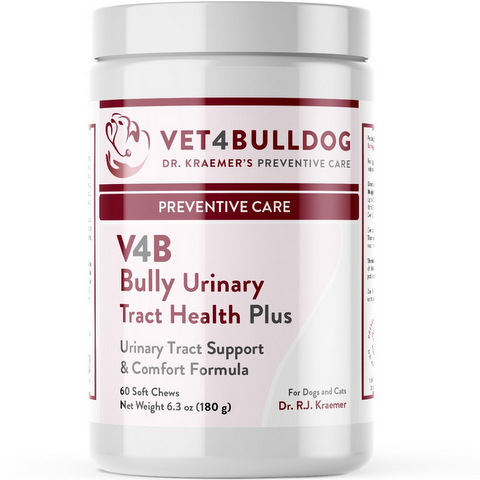
BULLDOG EMERGENCY BLOCKAGE & URETEROSTOMY:
Suppose your male dog was diagnosed with stones in the bladder and/or urethra. In that case, you should consider a permanent urethrostomy instead of just a cystotomy (opening the bladder) and/or a urethrotomy (opening the urethra).
A urethrostomy provides for a permanent “stoma” (opening), usually at the scrotal area
A urethrotomy is just a temporary opening to allow the stone to be removed.
BULLDOG URINARY STONE RECURRENCE WARNING:
The reoccurrence of urinary stones in bulldogs is unfortunately common, despite diligent efforts to prevent them. This recurrence often leads to the risk of re-blockage, requiring anesthesia and emergency surgery once again. Regrettably, many veterinarians fail to discuss these possibilities with their clients or are unaware of the high likelihood.
I’ve encountered numerous cases of stone recurrence shortly after the initial stone removal surgery. For some owners, the prospect of a second surgery or emergency treatment is financially daunting, leading them to surrender their dogs to rescue organizations.
Combining a permanent urethrostomy with the initial stone removal should always be offered
BULLDOG URINARY STONE REMOVAL SURGEON WARNING:
It’s essential to entrust this procedure to a qualified professional to minimize potential complications and ensure the best outcome for your pet, common complications are strictures and bleeding.
STONE REMOVAL BLEEDING WARNING
Following the surgery, it’s normal to observe some bleeding from the surgical site. In some cases, this bleeding may require medical attention, which could involve hospitalization and sedation for your bulldog.
Bulldog and French Bulldog URETHROSTOMY FINAL NOTE:
I’ve performed numerous urethrostomy surgeries for bulldogs who experienced recurring stone issues even after stone removal procedures. Fortunately, all of them have recovered successfully and resumed normal activities without encountering any notable complications.
In my experience, dogs adapt quickly to urinating through the new opening, although some minor accidents may occur initially. Owners often observe stones being expelled during urination, and any obstructions can typically be easily flushed out if they occur. Overall, the procedure has been successful in improving the quality of life for these bulldogs, and they can continue to thrive without major issues.

Urinary Stones in Bulldogs and Fr. Bulldogs MONITORING:
- optimal PH
- crystals
- infection
Recommended by Owners Approved by Bulldogs



